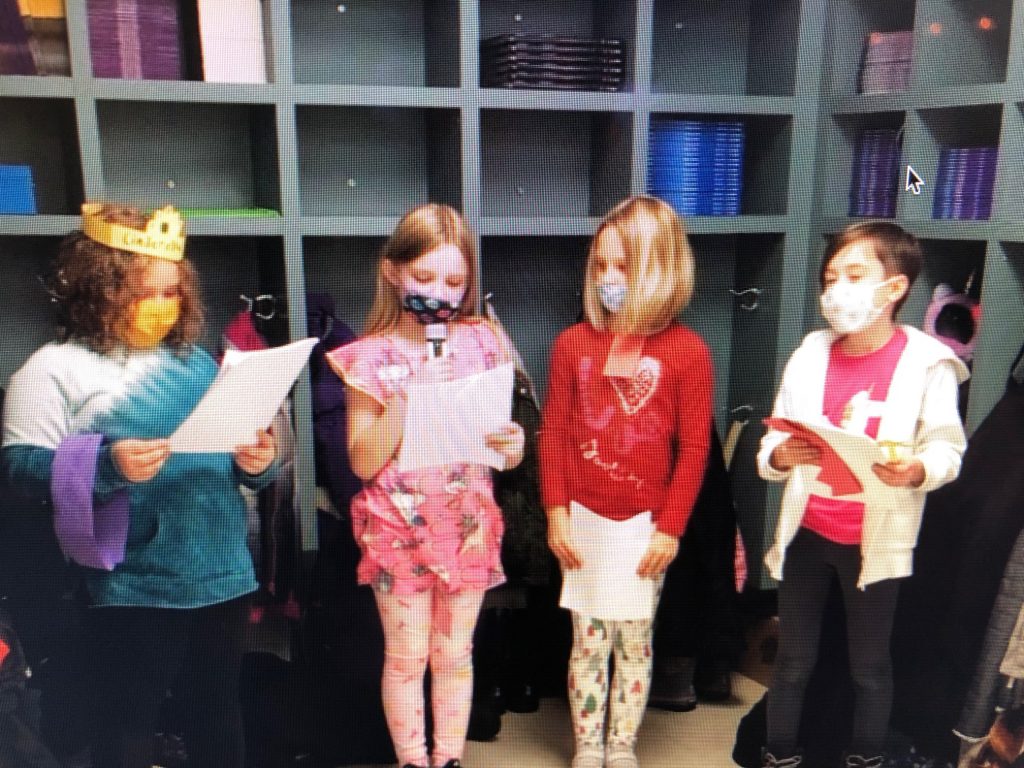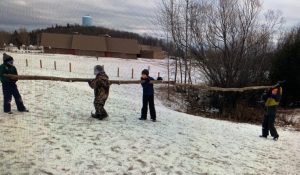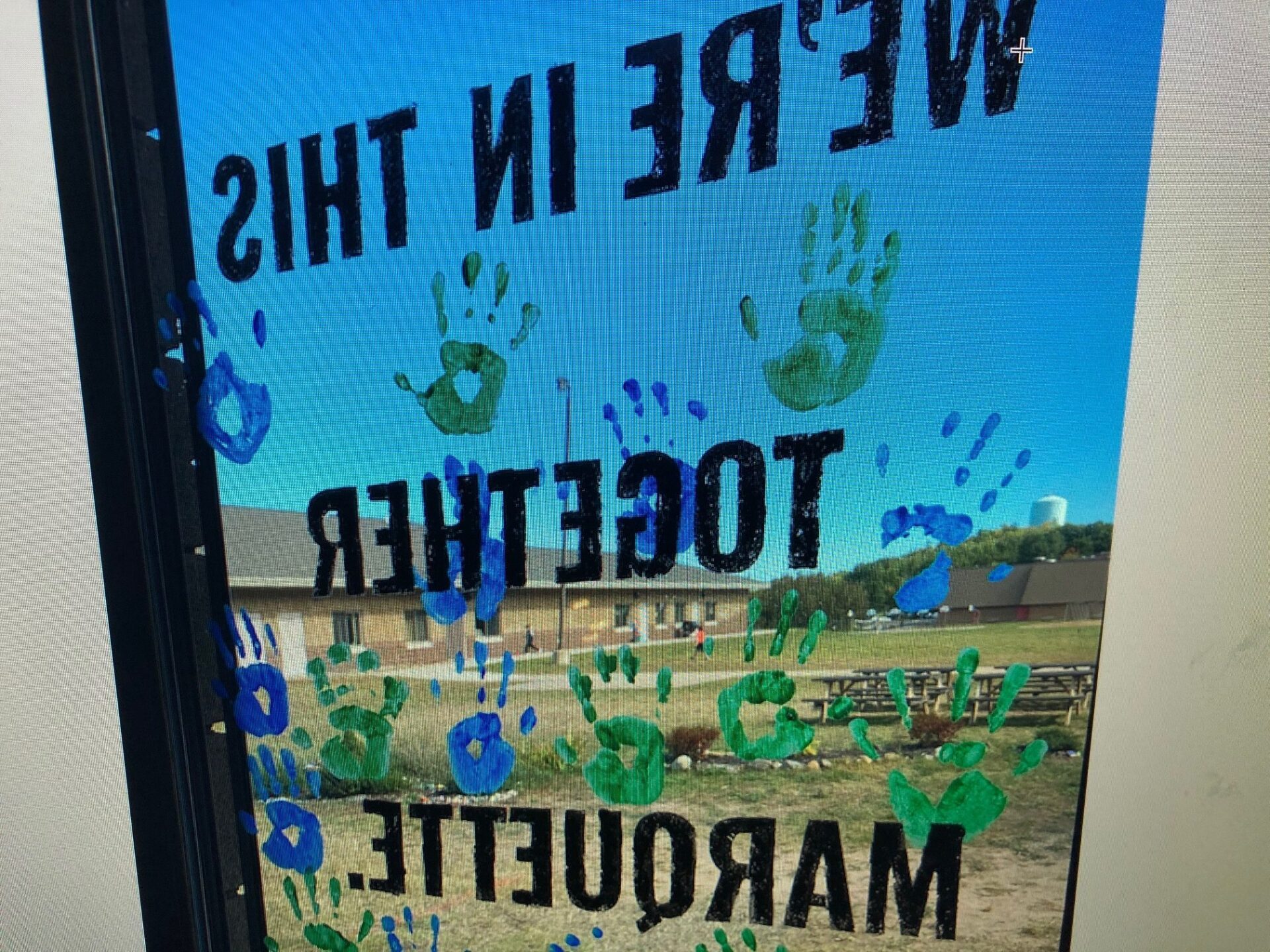Word from the Schools
Part One of Two
Though we see light at the end of the tunnel with the arrival of the vaccine, we also know that the date we return to some form of normalcy has yet to be determined.
While small businesses, particularly bars and restaurants, continue to struggle… and warrant our attention, our school system is operating under similar conditions, but on a much different scale.
Like pretty much every school system across the country, Marquette Area Public Schools has had to deal with an unprecedented set of challenges.
That includes everything from facilitating multiple classroom delivery systems… to trying to help students navigate a learning environment unlike anything they’ve ever experienced… to keeping 3200 students and a full complement of faculty and staff safe from COVID-19.
Strap that on.
Students, parents, teachers, staff, administrators… everybody associated with the schools is dealing with a new, and hopefully temporary, paradigm.

We recently met with four administrators with questions about MAPS and the pandemic. Attending the Zoom meeting were Zach Sedgwick, Principal at Superior Hills Elementary; Stephanie Anderson, Assistant Principal at Bothwell Middle School; Jon Young, Principal at Marquette Senior High School; and Bill Saunders, district Superintendent.
I asked the group about the challenges facing their teachers.
Zack Sedgwick- “It’s all about what’s best for the students, but teachers are not just answering the questions of the students. They also have the challenge of trying to help the parents troubleshoot issues they’re having, not just with the content, but also with the technology.
“In addition to that, as a teacher, as an instructional leader, you’re trying to recreate lessons online, to plan for two different formats. You’re looking to try to upgrade your lessons and sometimes completely redesign them so that they can be delivered electronically. You need to have time to actually do a lot of the paperwork and brick and mortar type tasks.
“And while you’re doing all that, you’re also managing classroom hygiene. You’re trying to make sure that everybody has the safest learning environment possible.”
Jon Young- “Time constraints right now are great. And our teachers, our support staff, everyone involved, is so concerned about the success of our students that they put in that extra time and effort that it takes to get everything done.”
ZS- “We have literally restructured everything that we’ve done at the school, starting with arrival all the way through dismissal.”
It sounds like the teachers have their hands full. Ya think? We also talked about the impact on the students.
Bill Saunders- “As educators, we’re going to have to look at the next 13 years, because of what’s happened with the pandemic. With the amount of face-to-face time that a lot of students have missed, there are going to be huge gaps in learning, and it’s going to be different for every student spread across all 13 grades from kindergarten through 12th grade. And as a district, we have a lot of students who are struggling right now. They’re struggling with the face-to-face because it’s so much different, as well as the hybrid and virtual formats.”
That sounds dire, but it should be noted that although some of the students struggle with the new and ever-changing formats, some in fact thrive. A lot depends on their previous experience with online technology. They’ve all done the Kahn Academy stuff on their Chromebooks, but that doesn’t necessarily translate to being comfortable with a more complicated internet format.
Speaking of the internet, what place will online learning have as we return to more normal circumstances?
JY- “We have an opportunity to look at some of these things and say, what has been successful with online learning and how might we be able to utilize that in a way that benefits our students? So for example, delayed starts, at a high school level might be something that you could look at and utilize online learning for. Maybe we could utilize the technology, the online learning to do something like that. There are different things that we could look at and find applications that could benefit our students and our staff.”
Later start times for the high school? Where do I login?
BS- “A lot of the data indicates that students are more successful in the face-to-face environment, but we’ve grown as a district with technology and through our virtual teaching in a very short period of time. And I think when we come out of this, on the other side, our teachers are going to be far more skilled than what they ever have been, in a lot of different technological ways.”

We also discussed an appeal MAPS administration has made to the powers that be in Lansing that would allow some ancillary responsibilities to be delayed, waived, or adjusted to accommodate the unusual workload faced by teachers and staff.
In a letter addressed to the state superintendent, with copies sent to legislators and other officials, and signed by MAPS administrators, the district is suggesting that educators’ time would be better spent focusing on instruction rather than testing and reporting.
And it sounds like the request for a little relief is based on some honest evaluation and a bit of soul searching.
Stephanie Anderson- “We had three separate discussions with the elementary level and then the high school and middle school levels where we all met at the table and asked the teachers to give us an overview of how things are going and what types of things they needed. And we had some pretty emotional discussions with our round tables, just hearing what it feels like working in the trenches. That was pretty powerful.”
While testing and reporting and attending to other state-mandated responsibilities shouldn’t be neglected, a one-off can probably be mitigated and survived. They’re simply asking that the people who make the rules recognize the extreme circumstances and consider an appropriate path forward. Sounds reasonable.
They also asked that teachers be rewarded with a modest bump of additional credit towards retirement. And why not! If we really mean it when we thank them for their service, let’s put some meat on the bone.
When asked about how the district is faring financially, the superintendent indicated that some different strategies came together that have helped MAPS stay in pretty good shape.
BS- “We did receive about $1.1 million in federal Cares Act money over the course of the summer and despite the threats to cut school funding, legislatively, they used a blended formula with the student count that actually gave us a short term kind of fix. We were down 60 or so students but because of that blended formula, it really didn’t have the detrimental effect that it would have in the past under previous pupil accounting methods.”
Principal Young sees some value in the experience.
JY- “Since March of last year, our teachers have been involved in what would probably be some of the best professional development that you could ever have… not asked for.”
We’re not here to minimize the challenges and struggles of every other person impacted by the pandemic… but the Marquette school system has a lot of moving parts, with each one moving differently than it ever has before. And there’s a lot at stake.
Whether you have any direct connection or not, the schools… OUR schools, are an extremely important part of this community.
From my vantage point, it looks like school leaders and staff are handling the pandemic as well as to be expected. The administrators here were candid with the problems and the plans. BS is an unfortunate acronym for the superintendent. We found him and the others to be forthcoming and fully engaged in the task at hand.
Let’s keep our educators in our collective thoughts. It’s the least we can do.
Friday we hear from teachers, parents, students, and the immediate past president of the Board of Education.
To see the full letter to the state, click here.


